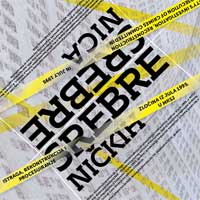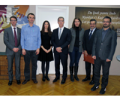„Srebrenica – Culture of Remembrance“ Panel Discussion
 The „Srebrenica-Culture of Remembrance“ Panel Discussion, organized by the Humanitarian Law Center (HLC) and the Friedrich Naumann Foundation, was held on September 14th, 2015, at the Media Center in Belgrade.
The „Srebrenica-Culture of Remembrance“ Panel Discussion, organized by the Humanitarian Law Center (HLC) and the Friedrich Naumann Foundation, was held on September 14th, 2015, at the Media Center in Belgrade.
The initial remarks at the Panel Discussion were made by Dušan Dinić, Friedrich Naumann Foundation Regional Coordinator for Western Balkans, and Sandra Orlović, Executive Director of the HLC, who, in their opening speeches commented on the shortcomings in the process of dealing with the past and the lack of a culture of remembrance in Serbia. One of the two main panelists, Dr. Soren Keil from the University of Canterbury, began his presentation with the question, ‘Why is there a need for remembrance?’ ; to which he offered two answers – the first one closely linked to forgiveness and dealing with the past, the second, linked to the process of democratization, which is of particular significance for Serbia because it concerns its international reputation. By giving the example of Germany, as his home country, and by applying its social processes to the territory of the Western Balkans, Dr. Keil further spoke about the phases in the process of building remembrance, linking the first phase to the actions of the political elite. This first step was imposed on Germany from abroad, whereas in the Western Balkans we are able to observe this process happening among the political elite, in the shape of public apologies and similar actions undertaken by politicians. The second part of the process, if observed through the German experience, began only thirty years after the end of the war; and it was a social and generation movement, embodied in the attitudes of the then younger generations towards their parents’ roles in the Nazi regime. The final part of the process would entail the overcoming of national stereotypes. In Serbia, this would mean to take a distance from the habitual discourse of suffering and role of the victim, because such discourses per se exclude the possibility of assuming responsibility for one’s own crimes. Referring to two, in his opinion, great successes in the process of building remembrance – the final court proceedings against certain perpetrators of crimes, as well as the commencement of an initiative for establishing a Regional Commission for Establishing the Facts About War Crimes (RECOM) – Dr. Keil nevertheless noted that the culture of denial is still widespread not only in Serbia, but also in all the other countries in the region, whereas the conflict of narratives is still existing among the communities. Dr. Keil sees the future in two separate processes – European integration and political commitment. Underlining that there is no unique solution, he pointed out the need for increasing the pressure coming from the European Union towards political elites on the one side, and strengthening regional cooperation in the process of building trust.
„Srebrenica – Culture of Remembrance“ Panel Discussion, 14.09.2015.
Professor Dubravka Stojanović from the University of Belgrade Faculty of Philosophy, analyzed in her opening speech the role and problems of education in the building of a culture of remembrance. Emphasizing the specific nature of the Yugoslav wars at the end of the 20th century, as one of the best researched and documented conflicts, Dr. Stojanović also spoke about why there is a need today to learn about Srebrenica, and about how to give lectures about Srebrenica and lead an expert discussion in schools. The sole opening of such a debate in history would be subversive for the education system here, which has not moved on from simple reading and repetition, and which, in her opinion, resembles more of a religious study than a school class. It is important for the reconciliation process to hear what the opposite side thinks and to offer different perspectives of the same historical events; for this, Dr. Stojanović offered two positive examples – the common Israel-Palestine history textbooks, and the project undertaken by history teachers in the countries of South-East Europe. The purpose of introducing different perspectives onto the same events is not, in her opinion, to find one real truth, but to develop an expert debate, in order to avoid a mythical understanding of history as a „natural phenomenon“, which occurs without any causes and repeats itself as some sort of an evil fate.
As an answer to the question whether dealing with the past and the building of a culture of remembrance are possible in conditions such as those at present, where the educational system represents a tool for creating servants, Dr. Keil returned once more to the role of the political elite in Serbia, and underlined the question, ‘Where was the Serbian political elite and what was it doing during the 1990s, and how much are members of this elite interested in the process of dealing with the past, when for them this often means dealing with their own past?’.
The panel discussion was held in cooperation and with the support from the Friedrich Naumann Stiftung, while displaying of an audio-visual presentation in Belgrade was made possible with additional support from the U.S. Embassy in Serbia, Open Society Foundation, Heinrich Boell Stiftung and Anne Frank Fonds.























